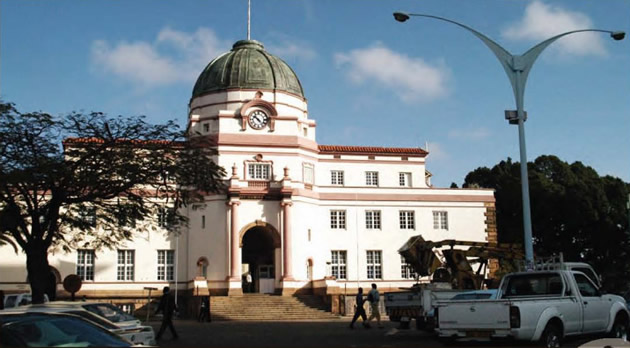Bid to stop parly hearings dismissed

Mashudu Netsianda, Senior Court Reporter
BULAWAYO High Court judge Justice Nokuthula Moyo has ruled that she has no power to stop a constitutional process that is mandated by the supreme law of the country.
Justice Moyo made the remarks as she dismissed an application by Habakkuk Trust, a local non-governmental organisation, which sought to have last week’s Parliamentary hearings on the proposed Constitutional Amendment No. 2 Bill suspended due to Covid-19.
Habakkuk Trust, through its lawyers, Job Sibanda and Associates, filed an urgent chamber application at the Bulawayo High Court seeking an order directing Parliament to postpone the public hearings until Covid-19 is over.
In papers before the court, Clerk of Parliament Mr Kennedy Chokuda, Justice Legal and Parliamentary Affairs Minister Ziyambi Ziyambi and the Parliament of Zimbabwe were cited as respondents.
Habakkuk Trust argued that the respondents were being unfair and unreasonable by risking the lives of the public through holding the meetings without putting measures in place to protect participants from Covid-19 during the hearings.
The organisation also contended that discussions would not bring a desired outcome as only 50 people or less would be allowed to partake due to the Covid-19 national lockdown regulations
Justice Moyo said all the three arms of the State were obliged to uphold the constitutional provisions of the country’s supreme law.
“We do not have the power to suspend constitutional processes per personal view, we are not allowed. I have not been favoured by the applicant with any case law authority that is precedent for suspending the Constitution thus applicant has not shown me that I do have the power to stop constitutional processes,” she said.
Justice Moyo said a court cannot stop or suspend a constitutional process except where the Constitution itself provides for such a scenario.
She said the public hearings were lawful in terms of the Covid-19 lockdown regulations.
Justice Moyo said Habakkuk Trust failed to present a well-grounded apprehension of the harm it was likely to suffer as a result.
The judge said the stoppage of a constitutional process and waiting for normalcy to return is also difficult to claim to sustain by the applicants. She said the processes can only be stopped upon reasonable grounds that fly in the face of Covid-19 prevention and safety measures.
“Applicant seems to want this court to assume that the mere fact that we are in the middle of a pandemic means that the public gatherings cannot be held. Applicant should have gone further to show how being in the middle of a pandemic is inconsistent with the holding of the public gatherings in a practical sense,” said Justice Moyo.
“I hold the view that applicant should have sought further details from respondents on how Covid-19 safety measures will be observed. In this matter, applicant has put the cart before the horse.”
The public hearings on the Constitutional Amendment No.2 Bill ran from Monday to yesterday across the country. In Bulawayo, the hearings were conducted on Wednesday.
Last year, the Government gazetted the Constitutional Amendment No.2 Bill, which seeks to introduce at least 27 amendments to the constitution.
The public hearings were initially scheduled to take place from March 29, to April 3, 2020 but were suspended together with all Parliamentary activities due to the Covid-19 pandemic.
In his founding affidavit, Habakkuk Trust chief executive Officer, Mr Dumisani Nkomo wanted an order interdicting the respondents from holding public hearings until measures had been put in place to contain and prevent the spread of Covid-19.
“The basis of the application is that the respondents have invited members of the public to attend such meetings at venues throughout the country beginning on 15 June until 19 June 2020 when Zimbabwe is currently under lockdown and public gatherings of more than 50 people is prohibited,” he said.
Mr Nkomo said the fact that public hearings are important and a constitutional requirement, it is unreasonable for them to be held in the middle of a pandemic and during a national lockdown.
Section 328 of the Constitution provides that a Constitutional Bill must, before it is presented in the Senate or National Assembly, be advertised in the Gazette by the Speaker of Parliament for a period of at least 90 days.
Immediately after such notice has been given, Parliament must invite members of the public to express their views on the proposed Bill through public hearings and written submissions.
“While the process of amending the Constitution in terms of Constitutional Amendment No. 2 cannot be stopped forever, I submit that because of its importance it must await the normalisation of the situation in the country,” said Mr Nkomo.
The respondents, through their lawyers Chihambakwe, Mutizwa and Partners, opposed the application, arguing that they were embarking on a process dictated upon them by the Constitution.
They argued Statutory Instrument 136/2020 amended the initial regulations to allow for public hearings conducted by Parliament.
“Section 4 (k) of S1136/20 amends section 5 of the previous lockdown regulations by stipulating that not more than 50 adult individuals gathered for the purpose of a public hearing conducted by a portfolio or other committee of Parliament for as long as masks are worn and social distancing rules are followed as well as disinfection of the area within which such a gathering is conducted are exempted,” argued the lawyers.
@mashnets











Comments